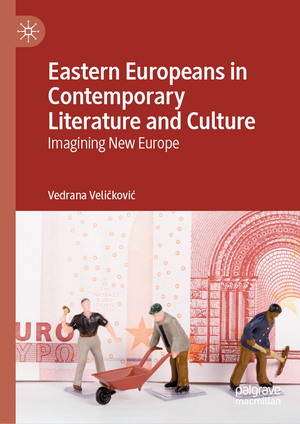Eastern Europeans in Contemporary Literature and Culture: Imagining New Europe
Autor Vedrana Veličkovićen Limba Engleză Hardback – 14 apr 2019
Preț: 781.45 lei
Preț vechi: 952.99 lei
-18% Nou
Puncte Express: 1172
Preț estimativ în valută:
149.53€ • 155.82$ • 123.81£
149.53€ • 155.82$ • 123.81£
Carte tipărită la comandă
Livrare economică 03-17 aprilie
Preluare comenzi: 021 569.72.76
Specificații
ISBN-13: 9781137537911
ISBN-10: 1137537914
Pagini: 224
Ilustrații: IX, 219 p. 1 illus.
Dimensiuni: 148 x 210 mm
Greutate: 0.43 kg
Ediția:1st ed. 2019
Editura: Palgrave Macmillan UK
Colecția Palgrave Macmillan
Locul publicării:London, United Kingdom
ISBN-10: 1137537914
Pagini: 224
Ilustrații: IX, 219 p. 1 illus.
Dimensiuni: 148 x 210 mm
Greutate: 0.43 kg
Ediția:1st ed. 2019
Editura: Palgrave Macmillan UK
Colecția Palgrave Macmillan
Locul publicării:London, United Kingdom
Descriere
This important and timely new book assesses modern representations of Eastern Europeans in contemporary literature and culture. With emphasis on the idea of a 'new Europe', Vedrana Velickovic articulately demonstrates the ways in which debates on migration refract broader crises of identity, and amount to a long-term shift in European attitudes between the late 20th and early 21st centuries.
Cuprins
“Where are they flocking from?”.- It’s a Free World?: Eastern Europeans in Contemporary Media and Film.- Representing Them: Eastern Europeans in Contemporary British Fiction.-Representing ‘Us’: Eastern Europe Writes Back.- New Alliances?: Eastern Europeans in Contemporary Black British Writing.- Eastern Europe and Race: Cosmopolitanism and the Post-Yugoslav Condition in Dubravka Ugrešić’s Essays.- Goodbye, New Europeans?.
Notă biografică
Vedrana Veličković is Principal Lecturer in English Literature at the University of Brighton, UK. Her research interests are in contemporary literature, specifically Black British and postcommunist writings. Previous publications include articles and book chapters on the intersections between postcolonialism and postcommunism, Bernardine Evaristo, Dubravka Ugrešić, Vesna Goldsworthy, and literary theory.
Textul de pe ultima copertă
Eastern Europeans in Contemporary Literature and Culture: Imagining New Europe provides a comprehensive study of the way in which contemporary writers, filmmakers, and the media have represented the recent phenomenon of Eastern European migration to the UK and Western Europe following the enlargement of the EU in the 21st century, the social and political changes after the fall of communism, and the Brexit vote. Exploring the recurring figures of Eastern Europeans as a new reservoir of cheap labour, the author engages with a wide range of both mainstream and neglected authors, films, and programmes, including Rose Tremain, John Lanchester, Marina Lewycka, Polly Courtney, Dubravka Ugrešić, Kapka Kassabova, Kwame Kwei-Armah, Mike Phillips, It’s a Free World, Gypo, Britain’s Hardest Workers, The Poles are Coming, and Czech Dream. Analyzing the treatment of Eastern Europeans as builders, fruit pickers, nannies, and victims of sex trafficking, and ways of resisting the stereotypes, this is an important intervention into debates about Europe, migration, and postcommunist transition to capitalism, as represented in multiple contemporary cultural texts.
Caracteristici
Examines recurring narratives about Eastern Europeans in film, fiction, and other media
Utilizes an intersectional approach of postcolonialism and postcommunism to discuss Eastern European othering
Explores practices of ‘writing back’ to the stereotypical representations of Eastern Europe/eans
Utilizes an intersectional approach of postcolonialism and postcommunism to discuss Eastern European othering
Explores practices of ‘writing back’ to the stereotypical representations of Eastern Europe/eans
